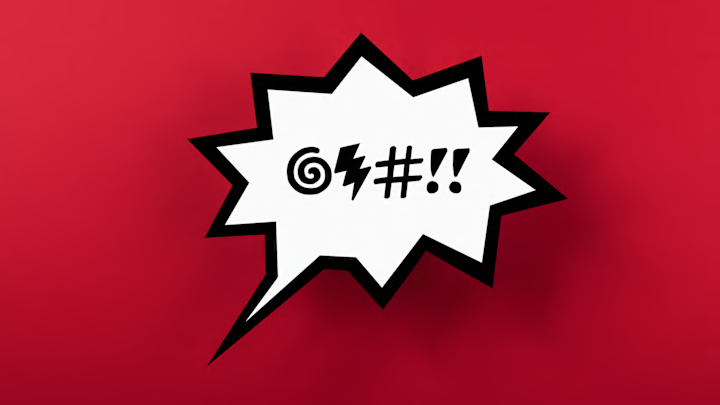If you've been using the B.S. word a lot lately, it might be time to change things up. Look no further: Here are 19 old-timey ways to call B.S. from all over the United States, courtesy of the Dictionary of American Regional English (DARE).
1. Fiddle on a Broomstick
Need to cry nonsense in Vermont? You could one-up fiddlesticks by saying, “Fiddle on a broomstick!” You could also say fiddle up a gum tree.
2. Fairydiddle
This Nebraska term is a variation of taradiddle, according to DARE, and might be influenced by “fairy tale.” Taradiddle meaning a lie or fib originated around 1796, according to the Oxford English Dictionary (OED), and by 1970 also meant pretentious or empty talk.
3. Fahdoodle
Another variation on an older word. Fa’doodle is British English from about 1670, according to the OED, while fahdoodle was recorded in New York as of the 1870s. Also related is the 19th century flapdoodle.
4. Malolly
“That’s a load of malolly!” you could say when you think somebody is full of it. This term is used in Georgia and Indiana, and variations include malollypop and molly.
5. Gurry
Other meanings for this Maryland saying for rubbish or nonsense include “diarrhea” from 16th century British English and “fish offal” from 19th century U.S. whaling lingo, according to the OED.
6. Bull Durham
This New York City euphemism is also a brand of tobacco. Other bullish yet delicate ways of saying B.S. include bullfeathers in Arkansas and bullcorn in Texas.
7. Bushwa
This rather old-fashioned Northern term originated around 1920, according to the OED. DARE says this probable euphemism for B.S. may also be influenced by the Canadian-French bois de vache, “buffalo dung,” or bois de cheval, “horse dung.”
8. and 9. Donkey Dust and Heifer Dust
Dust is a polite way of saying “manure.” Hence, donkey and heifer dust are literally manure from a donkey and heifer, and figuratively ways of saying bulls**t without saying it. Donkey dust is a Massachusetts native, while heifer dust hails from the Ozarks.
10. Bottlewash
Instead of “Hogwash!” you can also say, “Bottlewash!” What exactly is hogwash? The OED says that it first referred to kitchen scraps used to feed pigs, then to any low quality alcohol, and then to something nonsensical or ridiculous.
11. Applesauce
Applesauce became more than sauce from apples in the 1920s, according to DARE, and may also refer to insincere flattery and lies, per the OED. The term is attributed to Thomas Aloysius Dorgan, a cartoonist, sports writer, and inventor of slang whose phrases appeared in newspapers “at home and (in translation) abroad.”
12. Balooey
“Balooey!” a Texan might say if they think you’ve said something untrue. This nonsense word is a blend of baloney and hooey. Baloney meaning “humbug; nonsense” is from about 1928, according to the OED, while hooey is from 1924.
13. Bosh
Chiefly used in the South, South Midland, and Northeast, bosh first appeared in English in the 19th century. It comes from the Turkish word bosh, meaning empty or worthless, which entered English because of its use in a popular novel at the time, Ayesha, the Maid of Kars by British writer and diplomat James Justinian Morier.
14. Cush
Faced with nonsense in Virginia? “That’s a lot of cush,” you could say. DARE says this idiom for nonsense or rubbish might be related to cush, meaning a southern dish made with cornmeal or cornbread that can be sweet or savory.
15. Fush
Head up to New England and instead of cush, you’d say fush for “nonsense.” To be even more colorful, you could say, “Fush to Bungtown!”
16. Flabberdegaz
If someone from the Northwest says you’re full of flabberdegaz, watch out: They’re saying you’re full of “vain imaginings in speech,” says DARE. The word is probably related to flabbergast, to confuse or confound, and perhaps flabberdegasky, a 19th-century nonce word.
17. Flummadiddle
Flummadiddle, in addition to nonsense and foolishness, refers to a New England concoction of “stale bread, pork fat, molasses, water, cinnamon, allspice, and cloves,” says DARE. It's a “kind of mush, baked in the oven."
18. Flapdoodle
Speaking of weird food, flapdoodle (also spelled flapdaddle) is “an imaginary food of fools,” says DARE, as well as a term for “nonsense.” From The Adventures of Huckleberry Finn by Mark Twain: “He gets up ... and slobbers out a speech, all full of tears and flapdoodle.”
19. Flubdub
Flub-a-dub-dub, balderdash in a tub. This word for bombastic or inept language has been used in U.S. English since at least 1888, according to the OED. Former president Theodore Roosevelt used it cuttingly against his successor (and one-time friend) William Howard Taft, whom Roosevelt called “A flubdub with a streak of the second-rate and the common in him.”
A version of this story ran in 2017; it has been updated for 2022.
